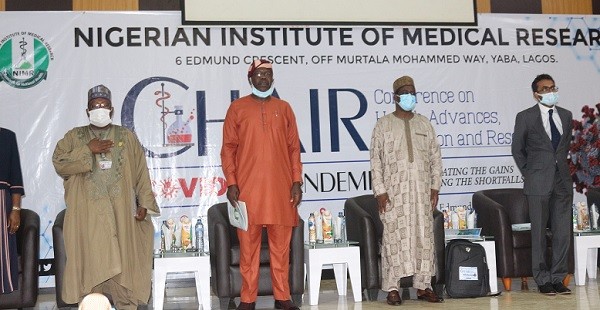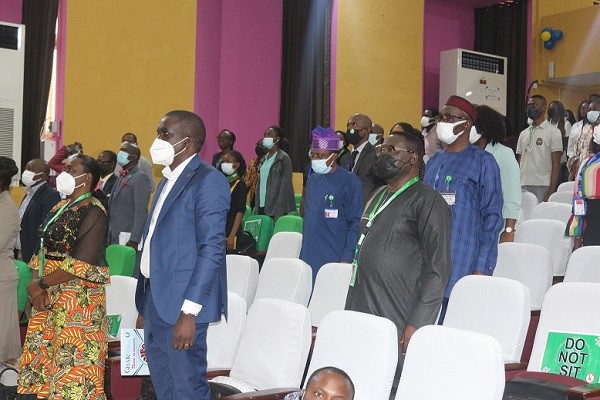-As Oladigbolu Congratulates Community Pharmacists on the Feat

In what appears to be the long-awaited response to community pharmacists’ quest to be part of the COVID-19 vaccination exercise, the Federal Government has disclosed her readiness to include pharmacies, private hospitals, all government health facilities, and other institutions as centres for vaccination, in order to expand COVID-19 vaccines roll out in the country.
Secretary to the Government of the Federation, and Chair, Presidential Steering Committee on COVID-19, Boss Mustapha, made the disclosure on Tuesday, while fielding questions from journalists at the Conference on Health Advances Innovation and Research (CHAIR) organised by the management of Nigerian Institute of Medical Research (NIMR). He asserted that since 70 per cent of Nigerians access their healthcare through private facilities, government won’t be able to reach 30 per cent of its population with vaccination if it is restricted to government facilities only.
This comes as the National Chairman, Association of Community Pharmacists of Nigeria (ACPN) Pharm. Adewale Oladigbolu, felicitated with community pharmacists across the country for a landmark achievement, in the actualization of their much-anticipated response from the Federal Government. Although, he noted that the information was yet to get to his office, but he assured his members that since it is coming from the presidential steering committee on COVID-19 and the NPHCDA, they should be optimistic about the implementation.
Oladigbolu, who spoke with Pharmanewsonline in a telephone chat on the development, expressed his gratitude to the Federal Government on her consideration of pharmacists’ plea, while also congratulating Nigerian citizens for improved access to vaccines, which will definitely improve healthcare outcomes in the country.

Mustapha, who was the special guest of honour at the 10th CHAIR, represented by Mukhtar Mohammed, secretary of the Presidential Steering Committee on COVID-19, said it has become imperative for the Federal Government to partner private sector in order to have effective and robust vaccination coverage for Nigerian citizens.
“Let me start by saying that 70 per cent Nigerians get their healthcare through the private facilities. And discussions have started, that even if we are to float all the public healthcare facilities with vaccines, we will still not reach 30 percent coverage. Therefore, we need to work with the private sector to have more innovated approach to ensure that people can access these vaccines through whatever mechanism.
“The government has started by issuing the directive of vaccine mandate to Federal Government workers by December 21. That is just the beginning, as we will be expanding vaccination centres to private health facilities, pharmacy stores, markets, parks, etc, to ensure that people have ensure access to vaccine wherever they are”, he stated.
Earlier in his keynote address, Executive Director/CEO, National Primary Healthcare Development Agency (NPHCDA) Dr Faisal Shuaib, had intimated the scientists on the progress made so far by the agency in vaccination coverage in country, as the nation aims at vaccinating 50 per cent of its eligible target population before Christmas, 2021. For this target to be actualised, he revealed that selected pharmacy stores will be included to the list of vaccination centres, in addition to private hospitals and other designated venues for the exercise.
Explaining other strategies to be deployed by the agency to meet the December target, out of the total population of Nigeria which is 216,797,455, he said while total eligible population is 111,776,503, only 5,573,349, people have been vaccinated with at least 1 dose, left with additional reach of 50 per cent target before Christmas which is 50,314,903.
“We are implementing 5 approaches to achieve optimization of process in developing the approach for COVID-19 vaccination roll-out. These include: Vaccination in primary, secondary and tertiary facilities; Expansion to private health facilities and corporate institutions (public and private, including selected pharmacy stores); Establishment of mass vaccination sites; Leveraging fixed and outreach R.I sessions; and Establishment of temporary posts – drive-throughs, community pop-ups”, he disclosed.
Speaking on the theme of the conference: “COVID-19 Pandemic: Consolidating the Gains and Addressing the Shortfalls”, Director General NIMR, Professor Babatunde Salako, applauded the efforts of NIMR and other institutions in mitigating the effects of the pandemic , while raising concerns on the direct and indirect impacts of the disease on Nigerians.
He drew attention of the audience to effect of the pandemic on other disease areas, especially in Nigeria that bears the highest burden of tuberculosis, HIV and malaria. The control of these diseases has indeed suffered a setback over the past year due to the shift on public health focus to the COVID-19. In addition, the indirect effect on mental health has also emerged.
“We must continue to pay particular attention to these disease of poverty both at individual researcher and government levels in order to alleviate the suffering of those afflicted with them, otherwise the gains of COVID-19 control may be lost to upsurge in HIV, malaria and tuberculosis”, he emphasised.










